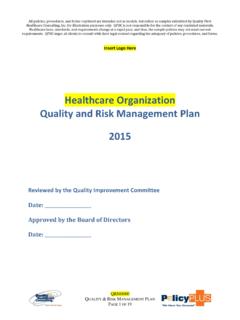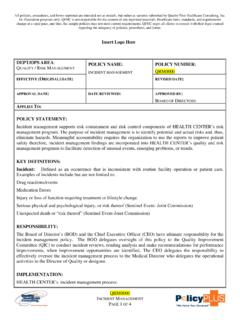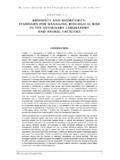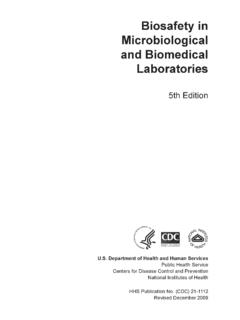Transcription of 2018 List of Reportable Diseases in Tennessee For …
1 Effective January 1, 2018 2018 List of Reportable Diseases in Tennessee Page 2 of 2 2018 List of Reportable Diseases in TennesseeFor laboratories The Diseases , events, and conditions Reportable to Tennessee Department of Health (TDH) by laboratories , including laboratories in healthcare facilities, are listed below for 2018. Refer to Page 1 of this document for a list of Diseases , events, and conditions Reportable by healthcare providers. laboratories should refer to the Detailed Laboratory Guidance document for additional guidance on Reportable tests and results, and specimen/isolate submission to the Tennessee Department of Health Laboratory. Laboratory reports, and the reporting form (PH-1600) (if needed), may be faxed directly to the local or regional health office (see ) or the Communicable and Environmental Diseases and Emergency Preparedness (CEDEP) Division at (615) 741-3857.
2 The PH-1600 also is available for completion online at More information about reporting is available on the Reportable Diseases website at For questions, contact CEDEP at (615) 741-7247 or (800) 404-3006. Disease Outbreaks ( , foodborne, healthcare-associated, waterborne) ! Acinetobacter species: Carbapenem- Resistant eip Anaplasma phagocytophilum, species Babesia species Bacillus anthracis ! Bordetella pertussis Borrelia burgdorferi Brucella species California/LaCrosse Serogroup viruses Campylobacter species Candida auris (includes rule-out) Chikungunya virus Chlamydia psittaci Chlamydia trachomatis Clostridium botulinum or botulinum toxin: Foodborne ! , Wound ! Infant Clostridium difficile eip Clostridium tetani Colistin-resistant (plasmid-mediated) gram negative bacteria Corynebacterium diphtheria, ulcerans Coxiella burnetii Cryptosporidium species Cyclospora species Dengue virus Ehrlichia species Enterobacteriaceae: Carbapenem-Resistant (all genera) Enterococcus species: Vancomycin-Resistant Invasive Disease Escherichia coli: Extended Spectrum Beta Lactamase-Producing eip Escherichia coli: Shiga toxin-producing Equine Encephalitis viruses: Eastern , Venezuelan , Western Francisella: tularensis , species Haemophilus influenzae Hepatitis, Viral- Type A Hepatitis, Viral- Type B: Acute Hepatitis, Viral- Type B: Perinatal (age 24 months), Pregnant Female (each pregnancy) Hepatitis, Viral- Type C: Acute, Chronic Human Immunodeficiency Virus Influenza A virus: Novel !
3 Klebsiella species: Extended Spectrum Beta Lactamase-Producing eip Lead Levels Legionella species Listeria species Measles virus ! Meningitis: Other Bacterial Middle East Respiratory Syndrome coronavirus (MERS-CoV) ! Mumps virus Mycobacterium leprae Mycobacterium nontuberculous species (extra-pulmonary only) Mycobacterium tuberculosis complex (M. tuberculosis, M. bovis, M. africanum, M. canettii, M. microti) Neisseria gonorrhoeae Neisseria meningitidis ! Plasmodium species Poliovirus Pseudomonas aeruginosa: Carbapenem- Resistant eip Rabies virus: Animal, Human ! Ricin toxin ! Rickettsia species (other than R. typhus) Rubella virus St. Louis Encephalitis virus Salmonella: Typhi , other species Shigella species Staphylococcus aureus: Enterotoxin B-producing (pulmonary) ! Methicillin-Resistant Invasive Disease eip Toxin-producing (TSST-1) Vancomycin Non-Sensitive (All Forms) Streptococcus agalactiae Invasive Disease Streptococcus pneumoniae Invasive Disease Streptococcus pyogenes: Invasive Disease Toxin-producing Treponema pallidum: Congenital , Other Trypanosoma cruzi Variola virus (Orthopox virus) !
4 Vibrio: cholerae , species Viral Hemorrhagic Fever viruses (including Ebola, Lassa, Marburg) ! West Nile virus Yellow Fever virus Yersinia: pestis , species Zika virus Special Reporting: All blood lead test results must be reported electronically or via fax. For more information, refer to or email UT Extension at for assistance. eip Refer to the Detailed Laboratory Guidance for catchment and/or send questions to Regular Reporting: PH-1600 only in 1 week (all Diseases for Regular Reporting) Phone immediately + PH-1600 in 1 week Phone next business day + PH-1600 in 1 week Specimen or Isolate Submission: Required Requested For more details about the laboratory tests and results, specimen or isolate submission requirements, and catchment areas for individual pathogens, please refer to the 2018 Reportable Diseases in Tennessee : Detailed Laboratory Guidance. 2018 Reportable Diseases in Tennessee : Detailed Laboratory Guidance 1 Directions for Laboratory Reporting The Diseases , events, and conditions Reportable to Tennessee Department of Health (TDH) by laboratories for 2018, including laboratories in healthcare facilities, are provided in the 2018 List of Reportable Diseases in Tennessee : For laboratories (Page 2 of the List).
5 This Detailed Laboratory Guidance document (referenced in the List) provides additional details regarding the Reportable tests and results, specimen source, and specimen/isolate submission to the Tennessee Department of Health Laboratory. Refer to for additional details about submission. Please contact the TDH Laboratory at (615) 262-6300 before submitting specimens or isolates for pathogens requiring immediate notification. Please refer to Page 5 of this document for blood lead test reporting. laboratories should report via electronic laboratory reporting or a printed laboratory report. Requirements for electronic laboratory reporting are available at Requirements for printed laboratory reports are below: (1) Patient demographics (including patient date of birth, address, sex, race, ethnicity, and telephone) (2) Ordering provider and facility name, phone number, address (3) Performing laboratory name, phone number, and address (4) Reporting facility name, phone number, address (5) Date of the laboratory report (6) Test performed (may differ from the test ordered) (7) Accession number (8) Specimen type/source and collection date (9) Result (quantitative and qualitative), interpretation, and reference range o If the printed laboratory report does not include the required information listed above, then the PH-1600 should be completed for the missing information and submitted with the printed laboratory report.
6 O laboratories are not required to report information in the Clinical Information section of the PH-1600. o The PH-1600 is available on the Reportable Diseases website at o laboratories also may report online at , where the PH-1600 may be completed and an electronic version of the paper laboratory report attached. o Laboratory reports and the PH-1600, if necessary, may be faxed directly to the local or regional health office (see ) or the Communicable and Environmental Diseases and Emergency Preparedness (CEDEP) Division at (615) 741-3857. For questions, contact CEDEP at (615) 741-7247 or (800) 404-3006. 2018 Reportable Diseases in Tennessee : Detailed Laboratory Guidance 2 Pathogen 1 Laboratory Tests and Results to Report to Public Health 2 Send Isolate or Specimen 3 Reporter 4 Detection in one or more specimens of etiological agents of disease or conditions, not limited to those listed in this document, are of urgent public health significance !
7 Detection in one or more specimens of etiological agents of disease or conditions not limited to those listed in this document that are of urgent public health significance. laboratories reporting outbreak events or conditions not listed in this Table but of public health significance should immediately contact the TDH Communicable and Environmental Disease Services via telephone at (615) 741-7247 or 1-800-404-3006. By Request L & P Acinetobacter species, Carbapenem-resistant eip Acinetobacter species from normally sterile sites, or urine and non-susceptible isolates (intermediate or resistant to at least one carbapenem or PCR detection of carbapenemase-producing gene). Results should not be sent via electronic laboratory reporting. Please include susceptibility test results. Report only for residents of Davidson, Cheatham, Robertson, Sumner, Wilson, Rutherford, Dickson, or Williamson counties. Contact for clarification/questions. -- L Anaplasma phagocytophilum, species Positive by any method for any specimen.
8 Include speciation results if known. -- L & P Babesia species Positive by any method for any specimen. -- L & P Bacillus anthracis ! Positive by any method for any specimen. Required L & P Bordetella pertussis Positive culture or detected by nucleic acid amplification or polymerase chain reaction (PCR) for any specimen. -- L & P Borrelia burgdorferi 1) A positive culture for B. burgdorferi 2) A positive two-tier test. This is defined as a positive or equivocal enzyme immunoassay (EIA) or immunofluorescent assay (IFA) followed by a positive IgM or IgG Western immunoblot (WB) for Lyme disease. An IgM WB is considered positive when at least two of the following three bands are present: 24 kDa (OspC)*, 39 kDa (BmpA), and 41 kDa (Fla). Disregard IgM results for specimens collected >30 days after symptom onset. An IgG WB is considered positive when at least five of the following 10 bands are present: 18 kDa, 24 kDa (OspC)*, 28 kDa, 30 kDa, 39 kDa (BmpA), 41 kDa (Fla), 45 kDa, 58 kDa (not GroEL), 66 kDa, and 93 kDa.
9 3) A positive single-tier IgG WB test for Lyme disease (see above for how to identify a positive IgG WB). While a single IgG WB is adequate for surveillance purposes, a two-tier test is still recommended for patient diagnosis. *Depending upon the assay, OspC could be indicated by a band of 21, 22, 23, 24 or 25 kDA. -- L & P Brucella species Positive by any method for any specimen. Required L & P California/LaCrosse serogroup viruses: California Encephalitis Virus, LaCrosse Encephalitis Virus, Jamestown Canyon Virus, Keystone Virus, Snowshoe Hare Virus, Trivittatus Virus Positive IgM. Quantitative IgG indicating a positive test result. Isolation of virus or demonstration of specific viral antigen or nucleic acid. Virus-specific neutralizing antibodies. Any specimen. -- L & P Campylobacter species Positive by any method (including culture, EIA, and PCR) for any specimen. Include speciation results if known. Submit specimen/isolate to the Tennessee Department of Health Laboratory within 2 weeks of detection/isolation.
10 Required L & P Candida auris (including rule-out Candida auris) Positive by any method for any specimen. Detection from any site/specimens (including swabs from skin). Please note: C. auris can be misidentified as a number of different organisms when using traditional biochemical methods for yeast identification such as VITEK 2 YST, API 20C, BD Phoenix yeast identification system, and MicroScan. See for greater detail. If species identity cannot be determined or one of the species shown in the table at above URL is identified, please contact HAI team at (615) 741-7247. Such isolates are considered rule out isolates. C. auris and rule out isolates should be submitted urgently to the Tennessee Department of Health Laboratory. Contact for clarification/questions. Required L & P Chikungunya virus Positive IgM. Quantitative IgG indicating a positive test result. Isolation of virus or demonstration of specific viral antigen or nucleic acid.











